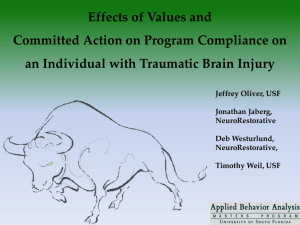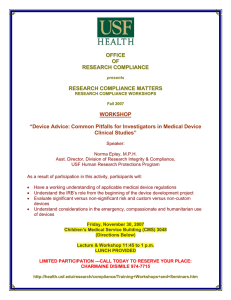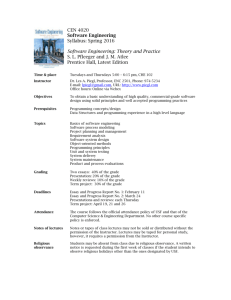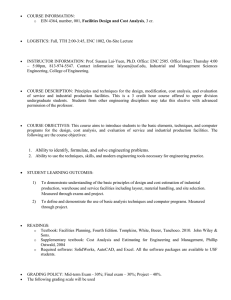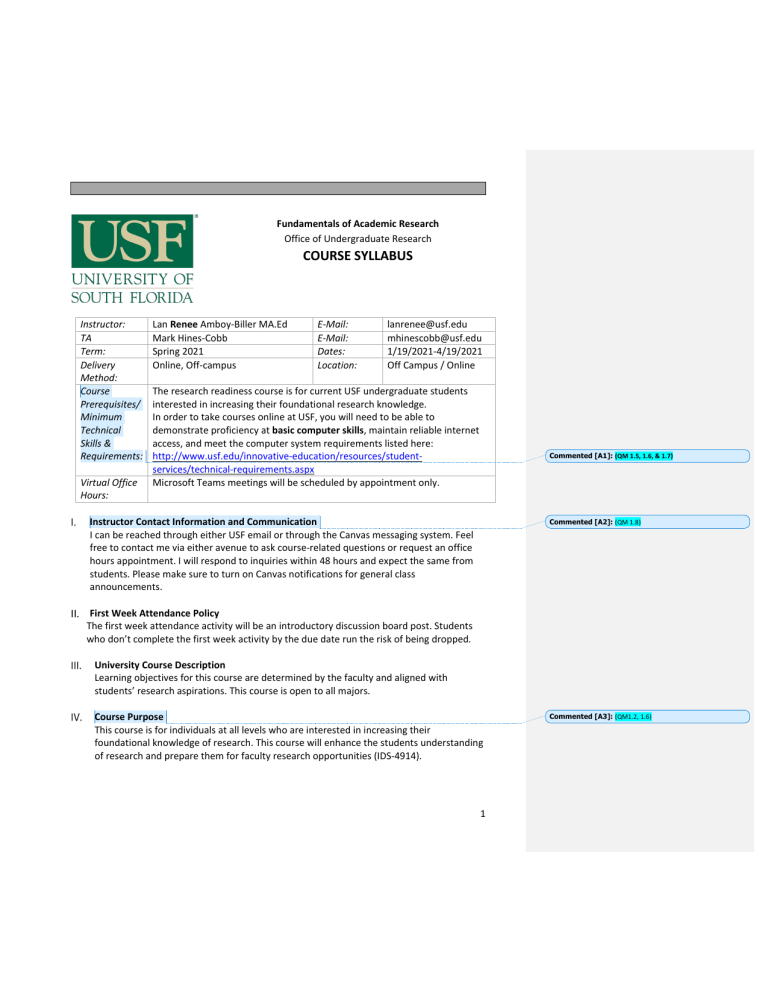
Fundamentals of Academic Research Office of Undergraduate Research COURSE SYLLABUS Instructor: TA Term: Delivery Method: Course Prerequisites/ Minimum Technical Skills & Requirements: Virtual Office Hours: Lan Renee Amboy-Biller MA.Ed Mark Hines-Cobb Spring 2021 Online, Off-campus E-Mail: E-Mail: Dates: Location: lanrenee@usf.edu mhinescobb@usf.edu 1/19/2021-4/19/2021 Off Campus / Online The research readiness course is for current USF undergraduate students interested in increasing their foundational research knowledge. In order to take courses online at USF, you will need to be able to demonstrate proficiency at basic computer skills, maintain reliable internet access, and meet the computer system requirements listed here: http://www.usf.edu/innovative-education/resources/studentservices/technical-requirements.aspx Microsoft Teams meetings will be scheduled by appointment only. Commented [A1]: (QM 1.5, 1.6, & 1.7) Instructor Contact Information and Communication I can be reached through either USF email or through the Canvas messaging system. Feel free to contact me via either avenue to ask course-related questions or request an office hours appointment. I will respond to inquiries within 48 hours and expect the same from students. Please make sure to turn on Canvas notifications for general class announcements. Commented [A2]: (QM 1.8) First Week Attendance Policy The first week attendance activity will be an introductory discussion board post. Students who don’t complete the first week activity by the due date run the risk of being dropped. University Course Description Learning objectives for this course are determined by the faculty and aligned with students’ research aspirations. This course is open to all majors. Course Purpose This course is for individuals at all levels who are interested in increasing their foundational knowledge of research. This course will enhance the students understanding of research and prepare them for faculty research opportunities (IDS-4914). 1 Commented [A3]: (QM1.2, 1.6) Course Structure This is an online course with 12 modules. Leaning activities include assignments, videos, quizzes, articles, and discussions. Commented [A4]: (QM1.2) Course Objectives At the completion of this course students will be able to define research, describe a research idea of interest, and explain the dos and don’ts of identifying a faculty mentor. Commented [A5]: (QM2.1) Student Learning Outcomes Commented [A6]: (QM2.1, 2.3) By the end of this course, you will be able to: 1. Explain what research is and what it looks like across disciplines. 2. Describe your own research interests and background effectively. 3. Identify and vet appropriate sources and differentiate between scholarly and nonscholarly sources. 4. Identify research resources across campus. 5. Write according to the necessary disciplinary standard (i.e. APA, MLA, Chicago, etc.) 6. Explain appropriate research designs for your chosen discipline. 7. Identify and approach an appropriate faculty member to initiate undergrad research. Required Course Materials There is no required book for this course. • This course will require several readings, all of which will be indicated in the modules and will be accessible through canvas or the USF library. • Access to a computer/laptop with internet and a webcam. Commented [A7]: (QM 1.5, 4.3, & 6.3) Supplementary (Optional) Texts and Materials • Suggested materials such as the discipline specific citation guides are recommended, however students can access this information online. Commented [A8]: (QM 4.3) Basis for Final Grade • Your final grade will be based on a combination of discussion board posts, homework assignments, quizzes, and assessments. There will not be any extra credit opportunities, however this course is structured for your success. If you keep up with the time sensitive discussion board posts, homework assignments, quizzes, and assessments you should have no problem doing well in this class. Even though this is a pass/fail course students must earn a 70 percent or above to successfully complete the course. The grading breakdown is as follows: Commented [A9]: (QM 3.2) 2 Assessment Percent of Final Grade Major Assignments Research Across Disciplines Slideshow Research Story Essay Knowledge Quest Annotated Bibliography Find A Scholarly Article Research Designs Slideshow Faculty Email Assignment 10% 10% 10% 10% 10% 10% 10% Minor Assignments Discussion Board Posts x 4 Quizzes x3 Homework x 3 10% 10% 10% 100% Grading Scale (%) 90-100 Pass 80 - 89 Pass 70 - 79 Pass 60 - 69 Fail 0 - 59 Fail Instructor Feedback Policy & Grade Dissemination The instructor will respond to email communication relevant to the subject matter within 48 hours of the date received. Instructor will provide feedback on assignments within one week of the posted deadline, and feedback on paper submissions within two weeks of the posted deadline. You can access your scores at any time using "Grades" in Canvas. Commented [A10]: (QM 5.3) Course Policies: Grades Commented [A11]: (QM 1.4, 3.2, & 3.3) Late Work Policy: As a rule, late work will not be accepted. In instances of extenuating circumstances, with appropriate documentation, students can contact the instructor to discuss late work exceptions. 3 Grades of "Incomplete": The current university policy concerning incomplete grades will be followed in this course. An “I” grade may be awarded to a student only when a small portion of the student’s work is incomplete and only when the student is otherwise earning a passing grade. The time limit for removing the “I” is to be set by the instructor of the course. For undergraduate students, this time limit may not exceed two academic semesters, whether or not the student is in residence, and/or graduation, whichever comes first. For graduate students, this time limit may not exceed one academic semester. “I” grades not removed by the end of the time limit will be changed to “IF” or “IU,” whichever is appropriate. Essay Commentary Policy: Commentary on essays and written assignments will be delivered in written format in the assignment comment box, or in the document using track changes. If desired, instructor comments will be made verbally and delivered to the student as an mp3 through Canvas. This approach yields far fewer written comments, but much more commentary in general is delivered, due to the speed and specificity of speech. Those requesting mp3 feedback must state so when the essay is turned in. USF Institutional Policies USF Undergraduate Academic Policies- http://www.usf.edu/undergrad/students/academicpolicies.aspx Commented [A12]: (1.4, 7.2) USF Graduate Academic Policies- http://www.grad.usf.edu/policies_sect7_full.php Academic Integrity of Students: Academic integrity is the foundation of the University of South Florida System’s commitment to the academic honesty and personal integrity of its university community. Academic integrity is grounded in certain fundamental values, which include honesty, respect, and fairness. Broadly defined, academic honesty is the completion of all academic endeavors and claims of scholarly knowledge as representative of one’s own efforts. The final decision on an academic integrity violation and related academic sanction at any USF System institution shall affect and be applied to the academic status of the student throughout the USF System, unless otherwise determined by the independently accredited institution. Disruption to Academic Process: Disruptive students in the academic setting hinder the educational process. Disruption of the academic process is defined as the act, words, or general conduct of a student in a classroom or other academic environment which in the reasonable estimation of the instructor: (a) directs attention away from the academic matters at hand, such as noisy distractions, persistent, disrespectful or abusive interruption of lecture, exam, academic discussion, or general University operations, or (b) presents a danger to the health, safety, or well-being of self or other persons. 4 Student Academic Grievance Procedures: The purpose of these procedures is to provide all undergraduate and graduate students taking courses within the University of South Florida System an opportunity for objective review of facts and events pertinent to the cause of the academic grievance. An “academic grievance” is a claim that a specific academic decision or action that affects that student’s academic record or status has violated published policies and procedures, or has been applied to the grievant in a manner different from that used for other students. Disability Access: Students with disabilities are responsible for registering with Students with Disabilities Services (SDS) in order to receive academic accommodations. SDS encourages students to notify instructors of accommodation needs at least 5 business days prior to needing the accommodation. A letter from SDS must accompany this request. Sexual Misconduct/Sexual Harassment Reporting: USF is committed to providing an environment free from sex discrimination, including sexual harassment and sexual violence (USF System Policy 0-004). The USF Center for Victim Advocacy and Violence Prevention is a confidential resource where you can talk about incidents of sexual harassment and gender-based crimes including sexual assault, stalking, and domestic/relationship violence. This confidential resource can help you without having to report your situation to either the Office of Student Rights and Responsibilities (OSSR) or the Office of Diversity, Inclusion, and Equal Opportunity (DIEO), unless you request that they make a report. Please be aware that in compliance with Title IX and under the USF System Policy, educators must report incidents of sexual harassment and gender-based crimes including sexual assault, stalking, and domestic/relationship violence. If you disclose any of these situations in class, in papers, or to me personally, I am required to report it to OSSR or DIEO for investigation. Contact the USF Center for Victim Advocacy and Violence Prevention: (813) 974-5757. Religious Observances: All students have a right to expect that the University will reasonably accommodate their religious observances, practices and beliefs. If you observe religious holidays, you should plan your allowed absences to include those dates. Students who anticipate the necessity of being absent from class due to the observation of a major religious observance must provide notice of the date(s) to the instructor, in writing, at the beginning of the term. 5 Campus Emergencies: In the event of an emergency, it may be necessary for USF to suspend normal operations. During this time, USF may opt to continue delivery of instruction through methods that include but are not limited to: Canvas, Blackboard Collaborate Ultra, Skype, and email messaging and/or an alternate schedule. It’s the responsibility of the student to monitor the Canvas site for each class for course specific communication, and the main USF, college, and department websites, emails, and MoBull messages for important general information. Student Expectations and Course Policies Turnitin.com: In this course, turnitin.com will be utilized. TurnItIn is an automated system which instructors may use to quickly and easily compare each student's assignment with billions of web sites, as well as an enormous database of student papers that grows with each submission. After the assignment is processed, as instructor I receive a report from turnitin.com that states if and how another author’s work was used in the assignment. For a more detailed look at this process visit http://www.turnitin.com. Essays are due at turnitin.com the same day as in class. Netiquette Guidelines: 1. Act professionally in the way you communicate. Treat your instructors and peers with respect, the same way you would do in a face-to-face environment. Respect other people’s ideas and be constructive when explaining your views about points you may not agree with. 2. Be sensitive. Be respectful and sensitive when sharing your ideas and opinions. There will be people in your class with different linguistic backgrounds, political and religious beliefs or other general differences. 3. Proofread and check spelling. Doing this before sending an email or posting a thread on a discussion board will allow you to make sure your message is clear and thoughtful. Avoid the use of all capital letters, it can be perceived as if you are shouting, and it is more difficult to read. 4. Keep your communications focused and stay on topic. Complete your ideas before changing the subject. By keeping the message on focus you allow the readers to easily get your idea or answers they are looking for. 5. Be clear with your message. Avoid using humor or sarcasm. Since people can’t see your expressions or hear your tone of voice, meaning can be misinterpreted. 6 Commented [A13]: (QM 1.3, 5.4) Email and Discussion Board Guidelines: 1. Use the subject line effectively by using a meaningful line of what your email or discussion is about. 2. Keep your emails and postings related to the course content. You should not post anything personal on a discussion board, unless is requested by the instructor. 3. Any personal, course or confidential issues should be directly communicated to the instructor via email. The discussion boards are public spaces; therefore, any issues should not be posted there. Commented [A14]: (QM 1.3) Course Technology & Student Support Commented [A15]: (QM 1.4, 1.5, 6.3, 7.1, 7.2, 7.3) Academic Accommodations: Students with disabilities are responsible for registering with Students with Disabilities Services (SDS) in order to receive academic accommodations. For additional information about academic accommodations and resources, you can visit the SDS website at http://www.usf.edu/student-affairs/student-disabilities-services/ . Commented [A16]: (QM 7.2) Academic Support Services: The USF Office of Student Success coordinates and promotes university-wide efforts to enhance undergraduate and graduate student success. For a comprehensive list of academic support services available to all USF students, please visit the Office of Student Success website at- http://www.usf.edu/student-success/ Commented [A17]: (QM 7.3 & 7.4) Canvas Technical Support: If you have technical difficulties in canvas, you can find access to the canvas guides and video resources in the “Canvas Help” page on the homepage of your canvas course. You can also contact the help desk by calling 813-974-1222 in Tampa or emailing help@usf.edu. Commented [A18]: (QM 7.1) Assignments Module 1: What is Research?, Research Across the Disciplines Slideshow Module 2: Discovering Your Research Interests, Writing Your Research Story Module 3: Knowledge Checkpoint 1, Knowledge Quest Module 4: Cite a Source! Module 5: Knowledge Checkpoint 2 Module 6: Annotated Bibliography Module 7: Find a Scholarly Article for Your Research Topic 7 Module 8: Knowledge Checkpoint 3, Research Designs Slideshow Module 9: Faculty Research Designs, Finding a Publication Module 10: Mentee Goals Module 11: Improving Your Communication Skills Module 12: Email to Faculty 8
